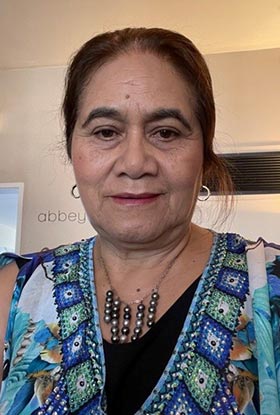
A more equitable and fair pathway is needed to support our Pacific sisters and brothers coming to work as nurses in Aotearoa New Zealand. We have an untapped and rich resource of skilled and highly trained nurses from many different Pacific nations, but there are so many hurdles for them to overcome before they can practise here, many just give up.
Before registration, their qualifications have to meet New Zealand standards. First, they must pass the occupational English test. Then they need to pass a competency assessment programme (CAP), which is costly. Only then, can they apply to the Nursing Council of New Zealand for registration and a practising certificate. This can end up costing thousands of dollars, and take incalculable hours of extra work on top of a day or night job with which most have to support themselves in the meantime.
So many give up, especially if they don’t pass all these hurdles on the first attempt. They take up roles as health-care assistants (HCAs) or work in other non health-related jobs instead – a loss not just for themselves, their families and communities, but for Aotearoa.
Only 2.3 per cent of the nursing workforce identify as Pacific, whereas 7.4 per cent of New Zealand’s population are Pacific peoples. We need more Pacific nurses to match the need for culturally appropriate care of our people.
We understand the importance of regulations and standards to ensure our nurses are competent to practise here, and can communicate and relate to the people they work and care for. We don’t want to downgrade New Zealand’s nursing standards – we want safe care for everybody. But we feel that more can be done to support the pathway of Pacific-trained nurses into practice here.
In recent decades, there have been initiatives to encourage Pacific nurses to work here. But these programmes have been one-off and not sustained, evaluated or embedded. And it is timely to take another look into how we can support this untapped resource, given the ongoing nursing workforce shortages.
The NZNO Pacific Nursing Section would like to see ongoing, wraparound support for nurses migrating from the Pacific. This should include financial, psycho-social, mentorship and cultural support to help them pass the English test and CAP and to transition into practice in the New Zealand health system.
These Pacific trained nurses are new migrants, trying to set up a new life here – they don’t have thousands of spare dollars, especially if they don’t pass first time around.
These Pacific trained nurses are new migrants, trying to set up a new life here – they don’t have thousands of spare dollars, especially if they don’t pass first time around. But they come with experience, commitment and a dream to contribute to the health-care needs of New Zealand. For many, however, their dreams and aspirations are shattered as they are defeated by the barriers.
Investment in this pipeline will bring long-term gains for our nursing workforce and we need to be more intentional and innovative about supporting the different workforce pipelines that we have. An investment in migrant Pacific-trained nurses would see more Pacific nurses, who are culturally and clinically experienced, working in the New Zealand system. This would help address the current nursing shortages – projected to become worse over the next few decades. We would see better health outcomes for our Pacific communities – who, statistically, die younger and suffer disproportionately from chronic health conditions such as cardiovascular disease and type 2 diabetes – the latter is three times as prevalent in Pacific communities than in the New Zealand population overall.
COVID-19 has only amplified the problem. Migration has been at a stand-still for the past year or so. Yet now, more than ever, we need to support our Pacific communities to get vaccinated. Nurses are stretched and Pacific communities more than ever need professionals who can speak their language, to help them navigate COVID-19 and immunisation. This requires knowledge of the many Pacific languages, to ensure our people can find their way through.
This need is only going to grow. We need supports in place for the future – to manage future pandemics and health crises as well as the inequitable health needs of Pacific communities and to purposely build our workforce to fit our increasingly diverse population.
See also ‘Connecting with our people’.
‘Eseta Finau, RN, MPH, is chair of NZNO’s Pacific Nursing Section.


